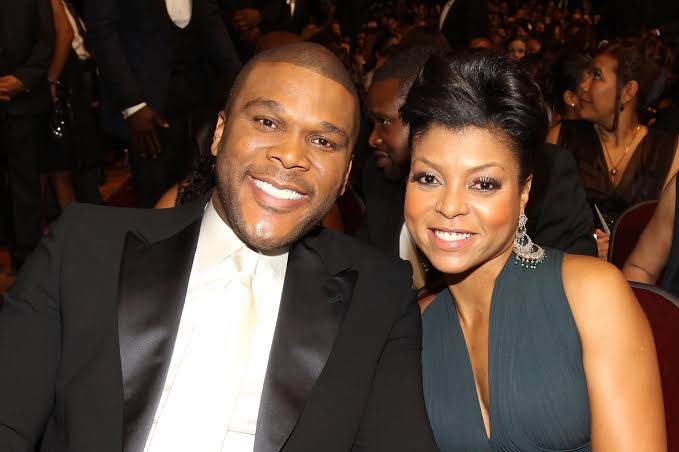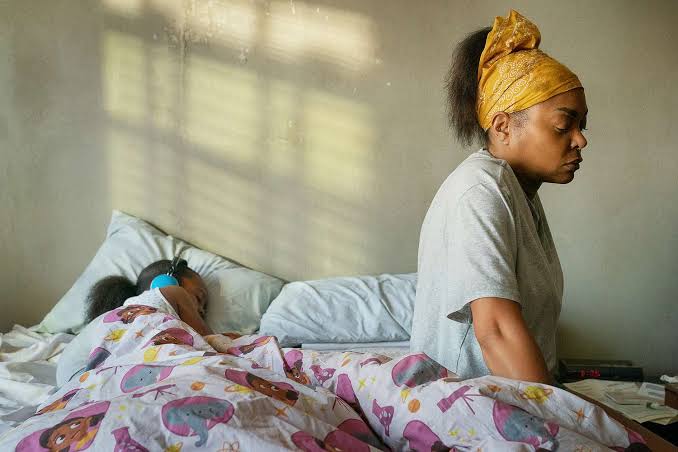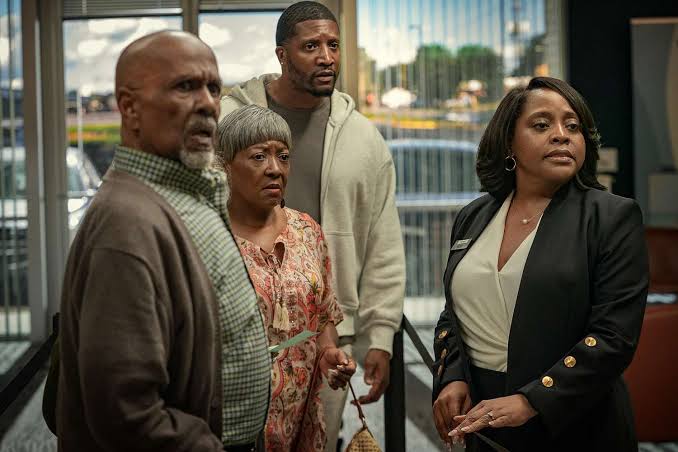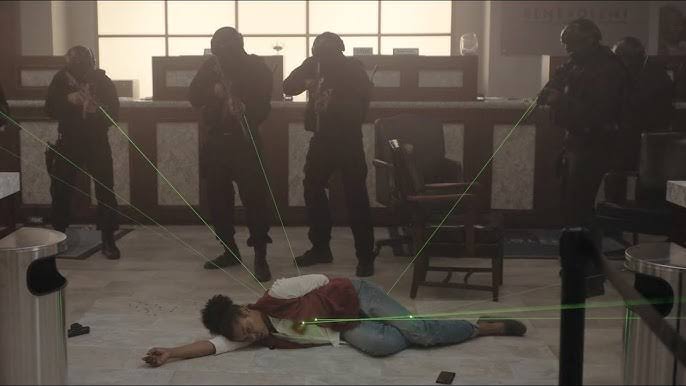Released on Netflix in May 2025, Straw is unlike anything Perry has done before. Stripped of gospel choirs and comic relief, it’s raw, unnerving, and deeply personal.

Taraji P. Henson delivers a blistering performance as Janiyah, a single mother so crushed by economic despair, bureaucratic indifference, and the silent collapse of mental health that her story unfolds like a psychological horror wrapped in social realism. A mother. A gun. A dead child. A livestream. And America watching.
But as brutal and timely as Straw is, something lingers.
It’s a story of descent. But what if it could have been a story of transcendence?
What if, instead of being framed solely by the trauma of American systems, Janiyah’s breakdown—and breakthrough—were interpreted through the spiritual and cultural cosmologies of Yoruba or Igbo heritage?
What if we viewed Straw not just as a tragedy, but as a modern African diasporic fable, embedded in ancestral memory and collective healing?
Let’s walk through the film—and through the cultural lenses that could have made Straw not just devastating, but sacred.
ACT I: ONE BAD DAY — AND A MOTHER AT BREAKING POINT

Original Scene:
Janiyah wakes up to discover her electricity is out, her daughter Aria is severely ill, and her landlord is pounding at the door. She’s fired from work, her car gets towed, and her pleas for help go unheard.
Yoruba/Igbo Spin:
If Janiyah were Yoruba, living in a compound in Agege or Akure:
The landlord (bàálè) isn’t just a rent collector — he’s a semi-elder, a moral voice. His eviction threat isn’t delivered coldly but with warnings like “Ìyá Aria, a ò le fi ebi kó ile bọ́…” (We can’t let you ruin this house with shame).
Yoruba respect culture would intensify her shame. Janiyah might kneel slightly while begging, using respectful greetings like “Ẹ̀ jọ̀ọ́ sir, ẹ ni binu si mi” — appealing not just to law but emotional decorum.
If she were Igbo, say in Onitsha or Enugu:
The landlord is likely a trader or retired civil servant, calculating but community-aware. The scene would involve sharp, cutting words like:
“Nwunye m, e nwere uche. You have stayed here 8 months without paying. I get family too!”

Her shame isn’t just personal; it’s communal disrespect — “Nwoke m, the neighbours don hear am. See as dem dey look me like story”.
In both cultures, loss of dignity is more painful than the loss of housing. That difference would crack open the heart of Nigerian viewers who’ve lived with the fear of being disgraced in public — in front of “people who know your mother’s name.”
ACT II: CRISIS BUILDS — NO CAR, NO HELP, NO ONE CARES
Original Scene:
 After being fired, Janiyah walks miles to retrieve her daughter’s school project. Her car is impounded. Aria worsens. Her phone dies. She is harassed by police and accused of neglect.
After being fired, Janiyah walks miles to retrieve her daughter’s school project. Her car is impounded. Aria worsens. Her phone dies. She is harassed by police and accused of neglect.
Yoruba/Igbo Spin:
In Lagos or Aba, this is where the cultural intensity would rise. In Yoruba and Igbo settings:
A bus conductor might insult her: “Madam, if you no get change, make you come down now now!” — turning the bus into a public stage for humiliation.
Police interaction could echo Nigeria’s well-known issues:
“You dey waka with pikin like say you wan thief? Wetin dey inside this bag?”
What adds emotional weight in Yoruba/Igbo settings is not just the chaos — but the presence of bystanders who comment, judge, or even join in:
In Yoruba areas, someone might mutter “Ṣé ọkọ ò sí nílé?” (Isn’t her husband home?), placing moral blame.

In Igbo areas, the widow/single mother stereotype might emerge: “Na so them dey do. No husband, no order.”
But also possible is a counterweight: an old woman giving her water, or a trader saying, “My sister, life no easy. Carry ya pikin come shade small.”
That dual reality — scorn and unexpected kindness — is a hallmark of Nigerian community life, and it would land much heavier in a Yoruba or Igbo context than in the anonymous American streets portrayed in Straw.
ACT III: THE BANK INCIDENT — WHERE EVERYTHING SNAPS
Original Scene:

Janiyah enters a bank to cash her final paycheck. She brings a mysterious box (Aria’s project) that security misidentifies as a bomb. A standoff begins. She refuses to leave without being heard.
Yoruba/Igbo Spin:
In Nigeria, a bank is a social theater.
If this were set in a First Bank in Ibadan or UBA in Umuahia:
People would quickly gather outside. Not just customers, but “area boys,” okada riders, women selling boli — all offering loud, unsolicited commentary:
“No be that woman wey dey cry yesterday? Wetin she carry? Bomb?!”
Bank staff might treat her coldly at first. But one sympathetic staff (perhaps a Yoruba woman) could soften: “Sister, calm down… Let’s talk. Ẹ jọ̀ọ́, ṣé a lè ba ọ sọrọ̀?”
Or an Igbo bank manager, visibly shaken, calls her “nwaanyị” and asks:
“Do you want people to see you like this? E nwere nsogbu?”
But what makes the scene cut deeper in Yoruba/Igbo culture is the real possibility of mediation by a community elder:
A passerby from her church or market might intervene with prayers or proverbs:
““Ẹ gbà mí, Ọlọ́run sànù fún obìnrin yìí.”
(May God have mercy on this woman.) “A sị na ndị mmadụ ka e ji ebi ebi mara onye” (It’s from people that family derives its meaning).

In the real Nigerian setting, the viral video of her breakdown might cause spontaneous community protests — especially among women. Churches might organize vigils. Traders could raise money for her.
Unlike in Straw, where the media becomes distant commentary, the Yoruba/Igbo response would be tactile, familial, interventionist.
ACT IV: REVEALING THE TRUTH — ARIA IS GONE
Original Scene:
 The audience learns that Aria had died the night before. Janiyah’s entire day was a mental dissociation. She is not holding a child — just memories.
The audience learns that Aria had died the night before. Janiyah’s entire day was a mental dissociation. She is not holding a child — just memories.
Yoruba/Igbo Spin:
The emotional reveal would be more than shocking — it would be culturally devastating.
A Yoruba elder might whisper “Ẹní bá fara mọ́ iku ọmọ rẹ… ìdí rẹ ní yó fọ́” (She who pretends her child didn’t die… will eventually break).
An Igbo elder might say “Uwa emee… ọkpụkpụ dị n’obi agaghị ezu ike” (When life happens… the bone in the heart won’t rest).
Her dissociation would be interpreted not just as mental illness, but as a soul refusing to be alone — a mother’s refusal to break from motherhood, even in the face of death.
The tragedy hits harder because Yoruba and Igbo cultures assign immortality to motherhood. A mother doesn’t just lose a child — she loses her future, her title, her identity.
ACT V: RESOLUTION — PUBLIC EMPATHY AND QUIET DIGNITY
Original Scene:
 With media coverage and patient negotiation, Janiyah is not shot or arrested. She surrenders quietly, hugged by Detective Raymond and Nicole.
With media coverage and patient negotiation, Janiyah is not shot or arrested. She surrenders quietly, hugged by Detective Raymond and Nicole.
Yoruba/Igbo Spin:
- In Yoruba or Igbo settings, resolution is incomplete without public commentary.
- Civil society groups might storm government offices demanding better mental healthcare.
- Her story would air on Channels TV, AIT, and radio programs. Nigerians would cry, argue, and share their own mother’s suffering.
- A local church, mosque, or village union could sponsor her therapy or house rent — not just from pity, but to “restore her name.”
- She may not be embraced by law enforcement, but she would be embraced by the people. Because in Yoruba and Igbo culture, even mad people are someone’s mother.
FINAL THOUGHT
Tyler Perry’s Straw is a heavy film. But layered in a Yoruba or Igbo world, the story would explode with cultural electricity. The shame would cut deeper. The kindness would feel more intimate. The grief more unbearable. The healing more believable.
Because in Nigeria, a woman’s pain is never fully hers alone — it becomes a family reckoning, a market rumor, a Sunday sermon, and eventually, a community burden shared.
That’s how Straw would hit harder — and last longer — in our hearts.













Leave a comment